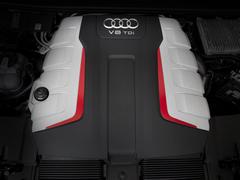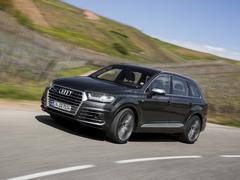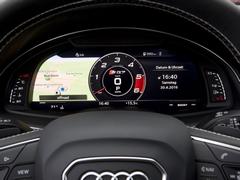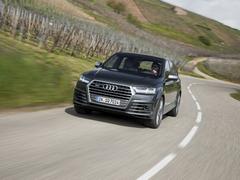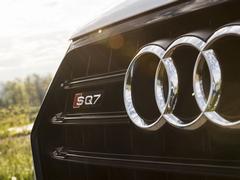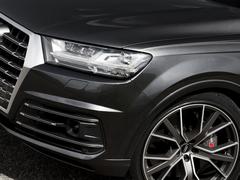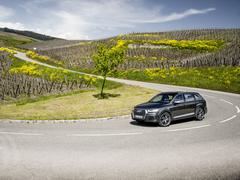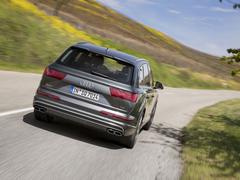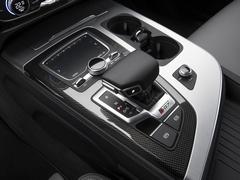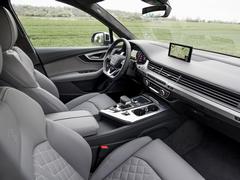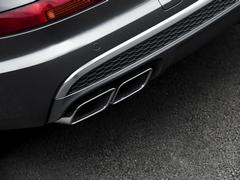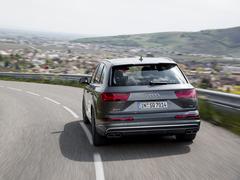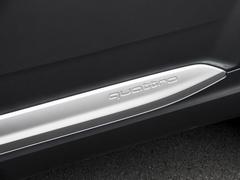Audi SQ7: Review
The future of performance diesels, or just another fast and expensive SUV?
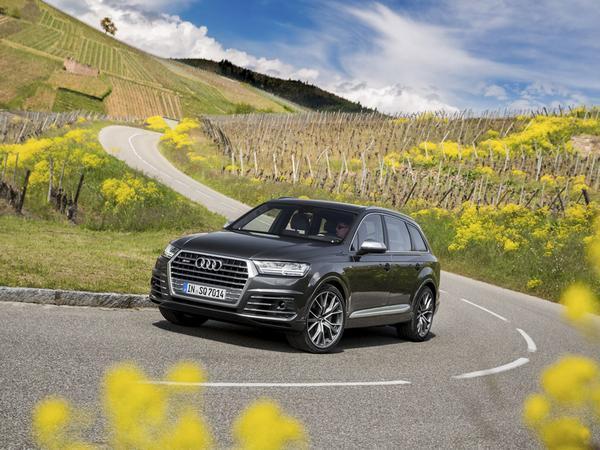
Because, let's be honest, it's another chintzy big SUV. Sure, the Audi 'S' embellishments are fairly discreet - see the mirrors, grille and exhaust - but there's no missing a Q7 on (optional) 22-inch wheels. It's a confident and assertive design without being too brash, but confident and assertive on something more than five metres long and just about two metres wide certainly makes an impression.
However, as mentioned, there's some very PH-worthy and interesting tech beneath the sheet metal. The first notable addition is the electric powered compressor, a technology first seen on the RS5 TDI prototype and claimed to be a global debut for a production car. It aims to eliminate turbo lag as the compressors use electricity rather than exhaust gases to spool up; turning at up to 70,000rpm, EPC provides "boost energy" for the turbos in less than 250 milliseconds. Audi says the system "augments the work of the two turbochargers", effectively filling in those gaps at low revs where conventional installations typically struggle.
Torque of the town
Furthermore, credit where it's due, the system is extremely effective. There's 664lb ft (that's not a misprint) available from 1,000rpm (neither's that) and the response from barely any revs is superb. Both throttle and engine feel instantaneous, the result being that the SQ7 can happily and swiftly mooch along at less than 1,500rpm without any of the lethargy you might expect of a turbocharged car, even a petrol. It's quite something. Indeed, most owners will probably see all of their performance demands catered for with less than 2,000rpm showing.
In addition, for those drivers keen to travel really rather quickly, the EPC gives the SQ7 a far broader powerband than you would expect from a diesel. It's willing, fast and eager for 4,000 revs, right to the 5,000rpm red line, which is an unusual and quite pleasant experience initially. The EPC is augmented by the first use of Audi's AVS valve lift system in a diesel too. This is not suddenly a VTEC-style diesel, instead - and Audi's words seem most appropriate here - "one cam contour supports starting off in conjunction with the EPC, while the other optimises cylinder filling and thus power at high engine speeds." It means the SQ7 is tremendously potent, at any revs and in any of the eight gears. It could be said the delivery is too linear to be truly exciting - always a possibility with peak torque from 1,000 revs - but the SQ7 certainly feels a step on for diesel engines. It even sounds like a proper V8, both inside and out.
Power station
The EPC is powered by a 48V sub-system, which is also used to supply the electromechanical anti-roll bars. Yes, there are so many electrical demands in this car it needs a sub-system to keep them going. A laudable feat of engineering or needlessly complex, depending on viewpoint.
Anyway, the anti-roll bars are again very clever, aiming to provide comfort on a straight road (by slackening the two halves of the bar around the gear set) and then offering support in corners by connecting the tubes back up and twisting them against each other. It certainly works in practice too, the Q7 refusing to pitch and yaw as you might expect from something so big.
There are problems though. The fancy anti-roll bars come as part of a Dynamic package that also includes a Sport Differential and all-wheel steering. The steering was a useful asset on the road, making the big Audi feel sharper and more agile than it would otherwise. The effects of the Sport Differential were far harder to detect, if at all.
But every single car provided on the launch was so equipped. Moreover, the carbon ceramic brakes (also optional) were smoking after a brisk drive down a mountain pass. In Audi's attempt to make the SQ7 more dynamic, it's been packed with more technology than both a regular electricity supply, or indeed 420mm front ceramic discs with 10-piston calipers, can handle. Which seems a bit daft really.
Smoke without fire
The SQ7 is far more capable on a challenging road than expected though. And the brakes hadn't entirely wilted. The bigger issue is that it's a joyless car to drive fast. Perhaps not the greatest surprise, or the most relevant observation, but there's no doubt that other cars in this super-SUV segment are more entertaining.
The Audi's additional tech does a fantastic job of keeping it locked down, the tremendous composure meaning you can carry great speed. But the driver doesn't have a clue what's going on. The roll bars mean the body barely moves, the engine works as well below 2,000rpm as it does beyond 4,000rpm and the steering always feels artificial. Then the traction control will cut in, but you won't be entirely sure why. The SQ7 drives how many people imagine the Nissan GT-R drives, albeit at a (slightly) less frantic pace: near total precision, huge speed and terrific grip, but with the driver feeling almost surplus to requirements. There are 24 driver assist systems in this car, with a few pointing towards piloted driving - sadly the driving experience seems to preview it as well.
On the motorway and around town, both arguably more valid tests of this car, the SQ7 is supreme though. The air suspension has excellent comfort even on the 22-inch wheels, the refinement at motorway speeds is fantastic and, wouldn't you know, the interior is marvellous. It even has seven seats as standard.
But these are attributes you would expect to find in any Q7. Where this car struggles is in justifying itself as a performance derivative, despite the amount of power on offer for the money. Bear in mind a V8 diesel Range Rover Sport is £15,000 more with nearly 100hp less. Perhaps there's an RS Q7 coming, ready to thunder up the road with the RS6's V8 shoving it along and making the Q7 a more emotive product. For now the SQ7 is an odd mismatch between an excellent powertrain that actually lends itself to more relaxed driving and a car that, with the right options added at least, is capable of covering ground extremely rapidly. The EPC is undoubtedly an intriguing advance for turbo engines, and it will be fascinating to see its next application, but this car will do nothing to convince the detractors of either fast SUVs or fast Audis.
AUDI SQ7
Engine: 3,956cc V8 twin-turbo diesel (with electric compressor)
Transmission: 8-speed auto, four-wheel drive
Power (hp): 435@3,750-5,000rpm
Torque (lb ft): 664@1,000-3,250rpm
0-62mph: 4.9 seconds
Top speed: 155mph (limited)
Weight: 2,330kg (unladen)
MPG: 39.2 (NEDC combined, on 20-inch wheels)
CO2: 190g/km (20-inch wheels)
Price: £70,970
Gassing Station | General Gassing | Top of Page | What's New | My Stuff

